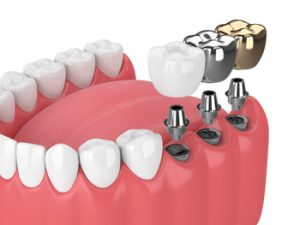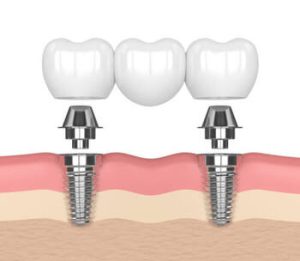Missing teeth can be a major concern, impacting not only your smile’s aesthetics but also your ability to chew and speak effectively. Fortunately, modern dentistry offers two excellent options to replace missing teeth: dental implants and bridges. While both methods serve the same purpose, the “dental implants vs. bridge” debate has garnered attention because they differ significantly in their approach and benefits when seeking the perfect smile.
This article dives into the world of dental implants vs. bridges, highlighting the advantages of implants and the limitations of traditional bridges.
Why Dental Implants Are Far Better Than Dental Bridges
Dental implants have become the standard for superb tooth replacement methods, offering numerous advantages over dental bridges. Here’s a breakdown of why implants are generally considered the superior choice:
Preserves Natural Teeth

Prevents Bone Loss
Missing even a few of your teeth will eventually lead to bone loss in the jawbone, as there’s no stimulation from the tooth root. Dental implants act like artificial tooth roots, stimulating the jawbone and preventing bone resorption. This maintains a healthy jaw structure and prevents the facial sagging that can happen with bone loss.
Enhanced Durability And Functionality
Dental implants are crafted from titanium, a highly biocompatible material that integrates itself with the jawbone over time. This creates an incredibly strong and stable foundation for the replacement tooth, mimicking the functionality of a natural tooth. You can expect dental implants to survive a lifetime with proper care, while bridges typically last fewer years and may require replacement.
Improved Aesthetics
Dental implants are specifically designed to blend seamlessly with your surrounding teeth. The crown (artificial tooth) on the implant is custom-made to suit the colour, size, and shape of your natural teeth, resulting in a natural-looking smile. On the other hand, bridges may appear bulky and sometimes show a black line at the gum line where they meet the tissue.
Long-Term Investment
While the upfront cost of dental implants may be higher than that of bridges, they are considered a long-term investment. Implants require minimal maintenance and typically don’t need replacement, unlike bridges, which may require repairs or replacements over time.
4 Major Disadvantages Of Regular Dental Bridges
While opting for a dental bridge offers a viable solution for replacing missing teeth, it comes with some drawbacks compared to implants:
- Damage To Healthy Teeth: Dental bridges necessitate grinding down natural adjacent teeth to accommodate the bridge structure. This weakens the natural teeth and increases their susceptibility to future decay and gum disease.
- Bone Loss: Bridges don’t stimulate the jawbone like implants. Over time, the jawbone beneath the bridge can deteriorate, leading to potential facial collapse and the need for further dental procedures.
- Shorter Lifespan: Dental bridges generally require replacement every few years due to wear and tear, potential issues with the supporting teeth, or changes in the jawbone.
- Potential Aesthetic Concerns: Bridges may not always perfectly match the surrounding teeth, leading to a noticeable difference in colour or shape. Additionally, the pontic (false tooth) may appear bulky, and the metal underside can sometimes show up on the gum line.
Tell-Tale Signs You Need A Dental Implant
Missing teeth can significantly impact oral health, overall well-being, and quality of life. If you’re experiencing any of the following signs, a consultation with a qualified dentist, including dental implants, is highly recommended to discuss potential treatment options.
Functional Difficulties
Missing teeth, particularly multiple missing teeth or those in critical locations for chewing, can significantly hinder your ability to eat effectively. You may struggle to chew certain foods, experience pain or discomfort while chewing, or have difficulty biting into tougher foods. This can lead to a highly restricted diet and potential nutritional deficiencies if you’re unable to obtain the nutrients your body needs from a variety of food sources. Additionally, missing teeth can impact your speech, causing slurring or difficulty pronouncing certain words.
Aesthetic Concerns
Missing teeth can have a noticeable aesthetic impact on your smile. This can lead to feelings of self-consciousness, affecting your confidence and social interactions. The gaps created by missing teeth can also make your face appear sunken or collapsed, prematurely ageing your appearance.
Oral Health Issues
Missing teeth disrupt the natural alignment of your remaining teeth, causing them to shift and potentially crowd each other. This misalignment can make it more difficult to maintain proper oral hygiene, increasing the chances of tooth decay, gum disease, and tooth loss. Additionally, the lack of stimulation from a tooth root in the jawbone can lead to bone loss at the site of the missing tooth. This bone loss can progress over time, affecting the stability of surrounding teeth and potentially impacting the viability of future dental implant placement.
Discomfort And Pain
Missing teeth can cause a variety of discomforts, including pain at the site of the missing tooth, particularly if there’s an underlying infection or nerve damage. Additionally, the altered bite caused by missing teeth can lead to jaw pain and headaches. Furthermore, difficulty chewing due to missing teeth can put undue stress on the remaining teeth and jaw joints, potentially causing discomfort or even temporomandibular joint disorder (TMJ).
Bone Loss Concerns
As mentioned previously, missing teeth contribute to bone loss in the jawbone. This bone loss not only impacts the stability of surrounding teeth but can also have a cosmetic impact on your facial structure. Early intervention with dental implants can help preserve bone health and prevent the need for more complex procedures like bone grafting in the future.
Long-Term Solution Desire
Dental implants offer a significant advantage over traditional dental bridges if you’re seeking a long-term, stable solution for replacing missing teeth. Unlike bridges, which rely on altering healthy teeth and may require replacement over time, dental implants are designed for long-term functionality and integrate with your jawbone for exceptional stability.
Exploring Different Dental Implant Options
The world of dental implants encompasses a variety of options designed to address each patient’s unique needs. The type of implant your dentist recommends will depend on several factors, including the number and location of missing teeth, jawbone anatomy, and overall oral health. Here’s an exploration of the most common types of dental implants:
- Single-Tooth Implant:
The most common type replaces a single missing tooth. A titanium screw is put into the jawbone, followed by the attachment of an abutment and a custom-made dental crown.
- Implant-Supported Bridge: This option is suitable for replacing multiple missing teeth. Instead of depending on healthy teeth for support, a bridge is secured to two or more dental implants placed in the jawbone.
- Mini Dental Implants: These are smaller implants used for specific situations, such as supporting dentures for patients with limited jawbone density.
- Overdentures: These implant-supported dentures offer improved stability and comfort compared to traditional dentures.
What You Should Expect When Getting Your Dental Implant Procedure
Dental implant surgery is a meticulous process designed to achieve long-term success and optimal oral health outcomes. While the specifics may vary depending on your situation, a general understanding of the different stages can help you confidently approach the treatment. Here’s a detailed breakdown of what to expect when getting dental implants:
Consultation And Planning
This initial appointment involves a thorough examination of your mouth, teeth, and jawbone. X-rays or CT scans may be taken to assess bone density and identify the most suitable implant type and placement. Your professional dentist will discuss your treatment plan, including the number of implants needed, the implant surgery process, recovery time, and associated costs.
Dental Implant Surgery
The surgical placement of the dental implant is mainly performed under local anaesthesia or light sedation by your dentist. During surgery, a small incision is made in the gum tissue to expose the jawbone. The implant post is then surgically inserted into the jawbone at the predetermined location. In some cases, bone grafting may be needed to increase bone volume before implant placement. Stitches are used to close the incision, and a temporary restoration may be placed on top of the implant site.
Healing And Osseointegration
Following surgery, it’s crucial to allow the implant to fuse with the jawbone through a process called osseointegration. This healing period typically takes several months, during which time the surrounding bone grows around the implant, creating a strong and stable foundation.
Abutment Placement
Once osseointegration is complete, a second minor surgical procedure is performed to place the abutment. The abutment is a small connector piece that attaches to the implant and serves as the base for the artificial tooth (crown).
Crown Placement
In the final stage, the permanent dental crowns, custom-made to match your surrounding teeth in colour, size, and shape, are attached to the abutments. This completes the dental implant restoration process, providing you with a natural-looking and fully functional replacement tooth.
Frequently Asked Questions
How much do dental implants cost?
The final cost of dental implants can change depending on several factors, including the number of implants needed, the complexity of the surgery, geographic location, and the dentist’s fees. Generally, dental implants are a more significant upfront investment than dental bridges. However, their long-term durability, minimal maintenance requirements, and health benefits for the jawbone often make them a cost-effective option in the long run.
Do dental implants hurt?
You will not feel much pain during the dental implant surgery due to local anaesthesia or sedation. Following surgery, you may experience some discomfort or swelling, which can be managed with relevant medication prescribed by your dentist.
How long does the dental implant procedure take?
The timeframe for the entire dental implant process can change based on the complexity of your case and the healing time. The initial consultation and planning typically take one appointment. The surgical placement of the implant itself usually takes one to two hours per implant. Following surgery, healing and osseointegration can take several months. Abutment placement and crown placement are typically minor procedures that can be completed in one appointment each.
How long do dental implants last?
With proper care, dental implants can endure daily wear and tear. They are highly durable and fuse with the jawbone, providing long-term stability. Maintaining good oral hygiene and adhering to regular dental checkups are crucial for the longevity of your implants.
Who is a good candidate for dental implants?

Reclaim Your Confidence: A Final Look At Why Dental Implants Are The Right Choice
Dental implants offer a superior solution for replacing missing teeth compared to traditional dental bridges. They preserve natural teeth, prevent bone loss, provide exceptional durability and functionality, and create a natural-looking smile. While the initial cost may be higher, their long-term benefits and positive impact on oral health make them a worthwhile investment. If you’re considering replacing missing teeth, discuss your options with a qualified dentist to determine if dental implants are the right choice for you.
Contact Infinity Dental Care, Winston Hills NSW 2153, at (02) 9159 6237 to reclaim your confidence with a new, dazzling smile.
Note: Any surgical or invasive procedure carries risks. Before proceeding, you should seek a second opinion from an appropriately qualified health practitioner.
Sources
“5 Reasons Why Dental Implants Are so Popular.” University of Illinois Chicago, dentistry.uic.edu/news-stories/5-reasons-why-dental-implants-are-so-popular.
Clinic, Cleveland. “Dental Bridges Vs. Implants: What’s the Difference?” Cleveland Clinic, 30 Apr. 2024, health.clevelandclinic.org/dental-bridge-vs-implant.
Colgate. “Bone Graft for Dental Implants: Understanding the Possibility.” Colgate®, 12 Feb. 2024, www.colgate.com/en-gb/oral-health/implants/bone-graft-for-dental-implants-understanding-the-possibility-0213.
“Dental Implant Surgery.” Mayo Clinic, 29 Jan. 2019, www.mayoclinic.org/tests-procedures/dental-implant-surgery/about/pac-20384622.
Robinson, Kara Mayer. “Types of Dental Implants.” WebMD, 26 Apr. 2022, www.webmd.com/oral-health/types-dental-implants.
Varley, Kevin, DDS. “5 Signs Your Patient Might Need Dental Implants.” Dentistry IQ, 28 July 2020, www.dentistryiq.com/dentistry/implantology/article/14180546/5-signs-your-patient-might-need-dental-implants.


 The most common type replaces a single missing tooth. A titanium screw is put into the jawbone, followed by the attachment of an abutment and a custom-made dental crown.
The most common type replaces a single missing tooth. A titanium screw is put into the jawbone, followed by the attachment of an abutment and a custom-made dental crown.